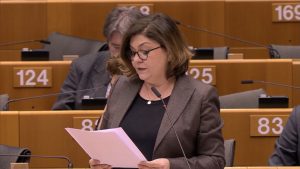 The EU Strategy on Sustainable and Smart Mobility comprises four principles that “will guide transport’s contribution to the European Green Deal”, the EU Commissioner for Transport, Adina Vălean, declared when addressed the European Parliament.
The EU Strategy on Sustainable and Smart Mobility comprises four principles that “will guide transport’s contribution to the European Green Deal”, the EU Commissioner for Transport, Adina Vălean, declared when addressed the European Parliament.
The principles will create a more sustainable transport system, will provide sustainable alternative solutions available to EU citizens and businesses, will respect the polluter-pays principle in all transport modes and will foster the connectivity and access to transport for all.
For the upcoming transport strategy, Vălean plans to put forward measures in four areas of action which will boost the uptake of clean vehicles and alternative fuels for road, maritime and aviation, will increase the share of more sustainable transport modes such as rail and inland waterways and will improve transport sector’s efficiency. Other two measures will see the incentivising of the right consumer choices and low-emission practices, while investing in low- and zero-emissions solutions, including infrastructure.
Vălean said that the policy actions will be guided by the ambition of the European Green Deal to ensure that transport makes its important contribution to climate neutrality by 2050 and at the same time will also take into account the digitalisation of the transport system to create a smart and sustainable mobility. “The Strategy on Sustainable and Smart Mobility will have these two objectives at its very heart and will guide us towards a transport sector that is fit for a clean, digital and modern economy,” the Commissioner explained.
The digitalisation will also pave the way to Mobility as a Service and the seamless combination of transport modes for a single journey, encouraging more people out of private cars and onto shared and more efficient forms of transport.
The Commission will pay attention to the Just Transition Mechanism, a key component to increase the accessibility, affordability and connectivity. It will mobilise EUR 100 billion to address the social and economic effects of the green transition, focusing on the regions, industries and workers who will face the greatest challenges.
While rely on a significant reduction of emissions from transport and harness digital opportunities for the sector, the EC will also be focused on the increase of safety and security. “Our strategy will incorporate measures for maintaining the highest safety and security standards in the world for transport,” Vălean said.
Not least, the EC will strengthen the EU global leadership, from blockchain and digital mapping and tracking, to connected and automated vehicles, trains, planes and vessels. “To secure our position at global level, we need to take investment in research and innovation very seriously, and we need to work closely with industry,” Vălean concluded.
Following the public consultation and the feedback from stakeholders, the EC will adopt the strategy for sustainable and smart mobility later this year. The strategy aims at the creation of a decarbonised transport sector, while reinforcing the connectivity and competitiveness.
Share on:



